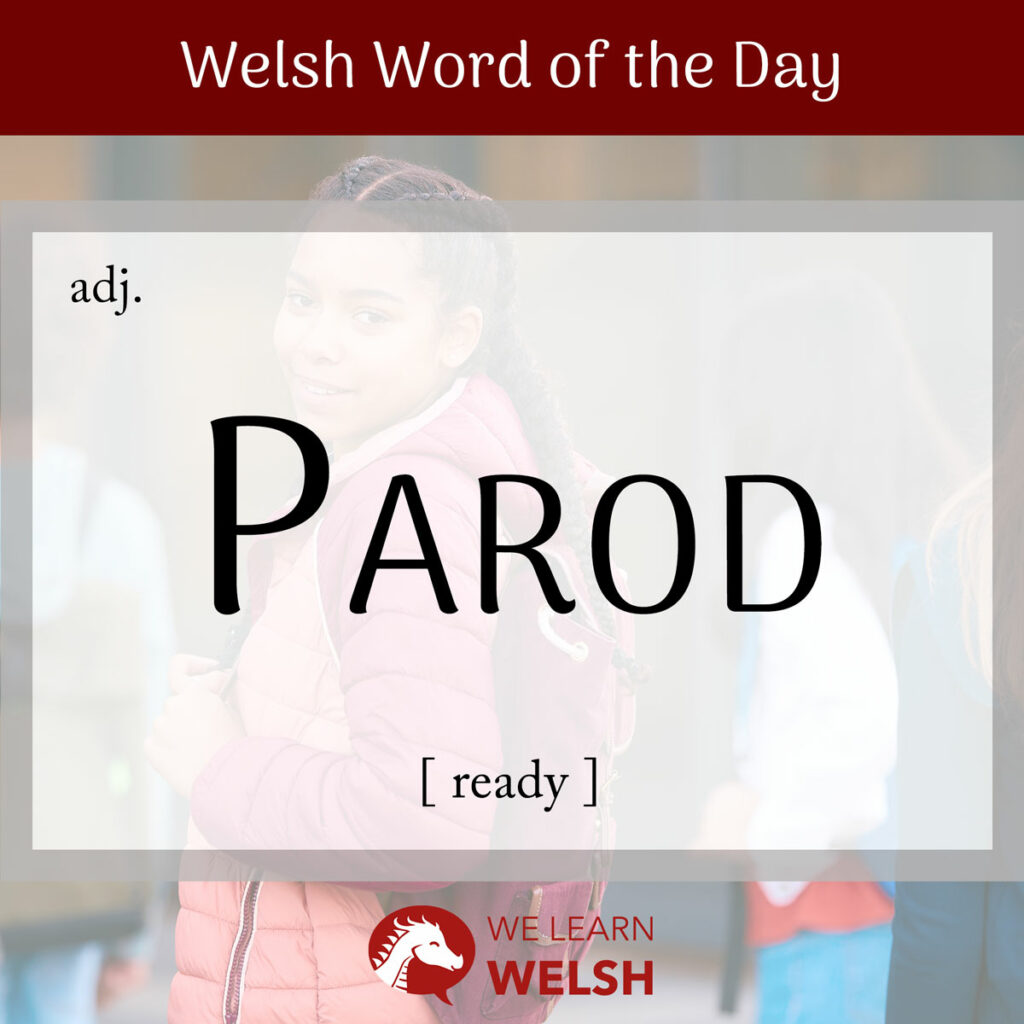Wyt ti’n barod (are you ready) to learn about the word parod (ready)?
If your answer is something like, “Hold on a second, those are two different words!”, don’t worry! This is just one of the many confusing consequences of the use of treigladau (mutations) in Welsh, but all will become clear in time!
parod
ready
Really, the word for ready is parod, with a p. It was borrowed into proto-Brythonic from the Latin paratus, meaning prepared, evolving through its Middle Welsh form *parawt to become the word we use today.
Most people pronounce parod as above, but some Southern Welsh speakers may instead use the following pronunciation:
Parod is roughly equivalent to ready in English – it can refer to something being ready as in having been prepared, someone being ready to do something as in willing, or to something which is pre-made, like a ready meal (pryd parod).
Unready is amharod, and readiness is parodrwydd. The word paratoi, meaning to prepare, is also a descendant of parod. It can be further modified into ymbaratoi, a reflexive form that you would use if you were preparing yourself.
Did you notice that the p has shifted to a b here? The prefix ym– has caused paratoi to undergo a mutation.
Soft mutation
barod
Nasal mutation
mharod
Aspirate mutation
pharod
There we go! The soft mutated barod, as above, is the form in which you will most commonly hear parod used.
This is because this word usually appears after the particle yn, for one of two reasons. Firstly, like with other adjectives, we often say mae rhywbeth yn barod (something is ready). Secondly, already is translated into Welsh as the adverbial phrase yn barod, which also means readily.
Mae swper yn barod heblaw am y tatws.
Supper is ready except for the potatoes.
Since yn always causes a soft mutation when it used in either of these ways (i.e. predicatively, or adverbially), barod shows up much more often than the original form parod. Luckily, mutations are the only change you’ll have to deal with for this adjective, as it doesn’t alter based on gender or number of the noun it’s describing.

There are actually plenty of synonyms for yn barod (already) in Welsh, depending on exactly how it’s being used. If it’s being used to mean by now, you can say erbyn hyn. If it’s being used to mean by then, you can use erbyn hynny.
For either case, you can use yn barod or eisoes. Eisoes is more formal, and usually goes before the verb, whereas yn barod always goes after the verb. Don’t be surprised if you hear people saying esys or ishws either – these are just regional variations on eisoes, common in the North and South respectively.
Dw i wedi gofyn yn barod.
I have already asked.
So, to recap:
| She was already swimming. | She is already swimming. |
| Roedd hi’n nofio’n barod. | Mae hi’n nofio’n barod. |
| Roedd hi’n nofio erbyn hynny. | Mae hi’n nofio erbyn hyn. |
| Roedd hi eisoes yn nofio. | Mae hi eisoes yn nofio. |
Nofio’n barod as above is simply a contraction of nofio yn. You don’t have to use this contraction if you don’t want to, and indeed, if you’re writing something formal, you shouldn’t. However you can safely use it in the spoken language.
This contraction also, and more unavoidably, occurs when you are describing something as being ready – it sounds awkward to say mae o yn (he is) rather than mae o’n (he’s). Sometimes, this is contracted even further into simply mae’n.
Mae’n barod am ei gyfweliad.
He’s ready for his interview.
All that being said, there are cases where we use the original version of parod. I am particularly fond of the phrase ateb parod. It literally means a ready answer, and is used to describe a slick reply. Similarly, someone who’s quick-witted is parod i’ch ymateb (ready to answer you back).
In today’s modern world of conveniences there are plenty of things that we consume in a parod form. Here are a few examples:
- coffi parod = instant coffee
- pryd parod / bwyd parod = ready meal
- cewyn parod = disposable nappy
- ffisig parod = over-the-counter medicine
- arian parod = cash
- tŷ parod = flat pack house
- dillad parod = ready-made clothes
A strong case for the argument that we are all getting too used to boddhad parod (instant gratification!)

